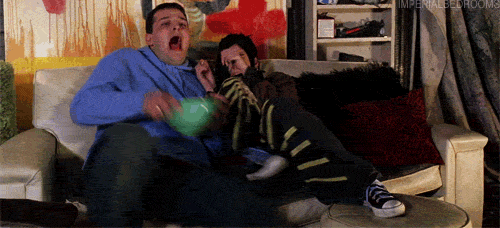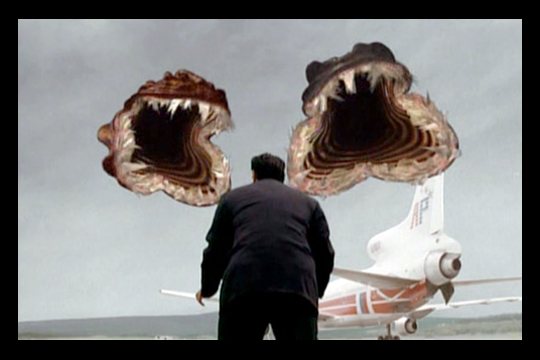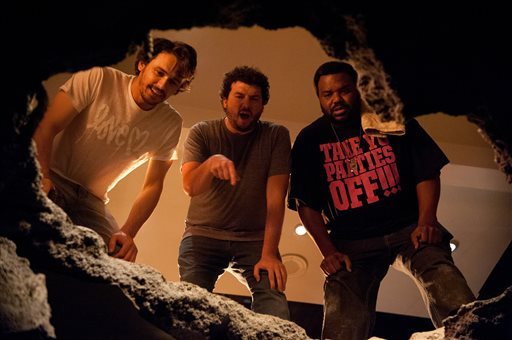Well, I just finished Actor’s Anonymous.
And, no, I don’t mean I’ve been moonlighting work for French films (that’s 60’s slang for sluts-on-film). It’s this novel James Franco did in the format of a 12 step program for actors that (hopefully) mixes fiction with fact. (I say that last bit because there’s this whole chapter that implies the kid actor from “Mysterious Skin” was actually molested by his costar in a way that paralleled the movie itself).
Yes. That movie wasn’t what I expected at all. Great performances, but I’d like to do some erasing too – Men In Black style. The only worse Hollywood subject matter I’ve made the same “WTF did I just watch?!” mistake of half-seeing was that retro movie Salo 120 Days – based on Dante’s Inferno.

“Worst episode of ‘Scared Straight’ ever!”
Don’t see it, ever.
Like, if The Ring VHS shows up at your house alongside that movie and you have to make a choice – pick the Chris Cunninham-esque death-in-7-days one.
Okay, moving on.
So, the book was unique in that it applied to a general audience. I can’t identify with acting for a camera as a profession, but inasmuch as we all put on some sort’ve façade for daily dynamics – yeah. Big time comparability to “us” everyday folk.
Taking it a filter out of context, you could even apply the concepts to movie characters. I mean, growing up, I always thought movies were how life was supposed to be. The end product in cinema seemed more “real” than real life itself (which I always thought Stephen King’s Langoliers could rip through like a 2D projector screen at any time).

Heh. Spesh effects seemed so much better when I was nine.
Maybe it was because they all followed a formula – like we try to do with religion.
There’s a beginning, middle, and end to a movie. We know there’ll be a resolution after the girl gets mad at the guy for making a bet with his buddies. The happy soundtrack tells you when everyone’s gotten over Aunt Beatrice’s death. The protagonist is the center of focus – while everyone else is a supporting character. And what’s more, the main guy never lacks a purpose, a drive, a guiding directive.
Meanwhile, back in reality, day-to-day tasks are still required if I never quite get past the apathy even after triple tall café mocha. The movie won’t cease to be if I fail to have a will, carry out developing my character, or meet a manic pixie dream character (yes, that’s a real thing).
No one yells “cut!” over the missing montage that’s supposed to carry me through the boredom of work and Wegmans trips for groc- Eh. Who am I kidding? I feel like singing “Little Town” and clutching a book to my tits whenever I walk through there.
#8daysaweek

But what Franco was writing about had less to do with movie characters and more to do with the actual actor’s task – and how it relates to everyone. He even comically portrayed the director as a “Higher Power”. To my surprise, it exemplified the uncertainty of reality. Much like actors are appalled at which take a director decides on, I never know what impression I’m making on people. And it kills me. They might think I’m an asshole (when obviously I’m brilliant and thus feel compelled to convince them… by being an asshole). But I have no control over it. The decision’s done.
And what I thought I meant in someone’s mind, is actually on the cutting room floor.
Likewise, interplay between actors isn’t so different (if they’re any good).
When we’re being daydreamy, people can totally tell. There’s this part in the story where the director yells at an actor because he’s visibly trying to draw up a sense memory instead of playing off the raw emotion his colleague’s giving him. For us regular folk, that same ADD gaze can destroy a good connection faster than pulling out an iphone while issuing an exasperated sigh. It’s taken until recently for me to realize that we all have telepathy to a degree. I mean, people may not be able to read your thoughts, but they can definitely read when your thoughts are elsewhere.
Sometimes what’ll help is saying, “Sorry. I got distracted. Can you repeat that?” Then (if I wasn’t daydreaming sex, drugs, or morphing into a dragon and burning down the building with my nasal napalm) then I’ll tell them how what they said spurred some internal eureka moment. People are less offended if they know what they said helped you.
‘cause it means you were at least listening to part of what they said before the brain train took off into oblivion.
That, and that you’re human.

And, speaking of help, the way service gets discussed is hilarious.
He definitely doesn’t depict himself as some benevolent do-gooder, either. That first knee-jerk reaction about seeing kids with deformities is so blatantly honest – and because there’s no cruelty in it, you can’t help but laugh. It’s just a description of a human reaction. We all judge. We just (try to) filter what comes out of our mouths to who we’re judging. He stays, helps out the kids, and describes how different everything looked after leaving – how much prettier the same drive he took all the time felt that day.
And maybe that’s what it’s all about. We may not be assigned a narrator or have a third-person perspective to ask “what’s my motivation for this scene? And the next? And the next…?”
But what we do have is the capacity to change every scene as it comes- by being present enough to read our “costars” and respond to that – not some perfect cinematic idea of it.
We can help them out, say thanks when they’re the cause of our billion dollar idea (with the understanding they’ll get none of the actual money), and remember that we’re all just supporting characters for the big movie called life.
…which I still totally believe might be lacerated by a space-time chasm at any effing moment.

Leave a Reply